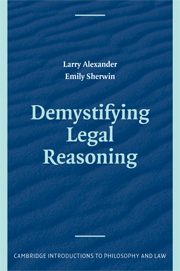Epilogue: All or Nothing
Published online by Cambridge University Press: 05 June 2012
Summary
Legal decision making is sometimes described as a craft. To decide cases, judges apply forms of reasoning and techniques of interpretation they have learned over a lifetime of exposure to the decisions of their legal ancestors. They reason by analogy, construct legal principles, and find meanings in canonical texts that differ from the intentions of the authors of those texts. The methods of legal decision making are not accessible to those outside the profession. To some extent, they are inscrutable even to insiders, including judges.
The outcome of judicial craftsmanship, however, is widely acclaimed. The methodology of law is believed to constrain judges without displacing their moral judgment or binding them to the terms of legal rules. It prevents judges from imposing their personal beliefs on society but frees them to pursue the spirit of the law rather than the intended prescriptions of lawmakers. Consequently, it has enabled judges to generate a body of common and interpretive law that supports peace and prosperity but also adapts to changes in social and economic conditions and conventional morality.
We do not accept this description of legal decision making. Our own view is much simpler. In our view, there is no such thing as analogical decision making, case to case. Judges who resolve disputes by analogy either are acting on a perception of similarity that is purely intuitive and therefore unreasoned and unconstrained, or they are formulating and applying rules of similarity through ordinary modes of reasoning.
- Type
- Chapter
- Information
- Demystifying Legal Reasoning , pp. 233 - 236Publisher: Cambridge University PressPrint publication year: 2008



